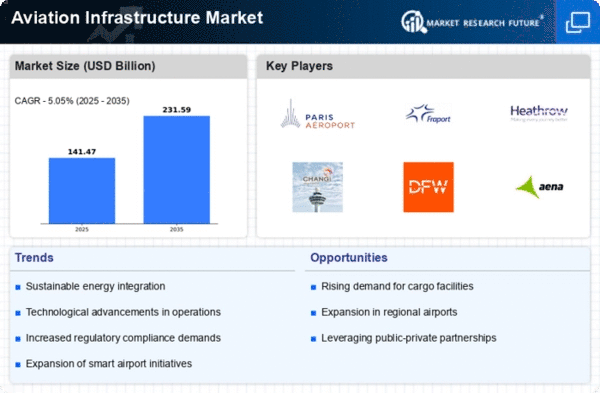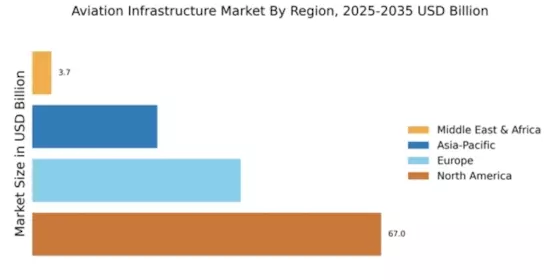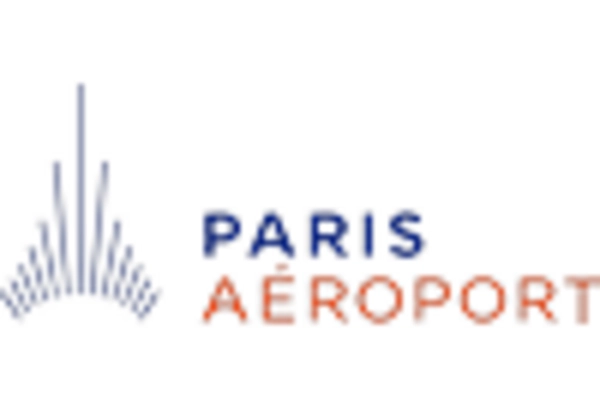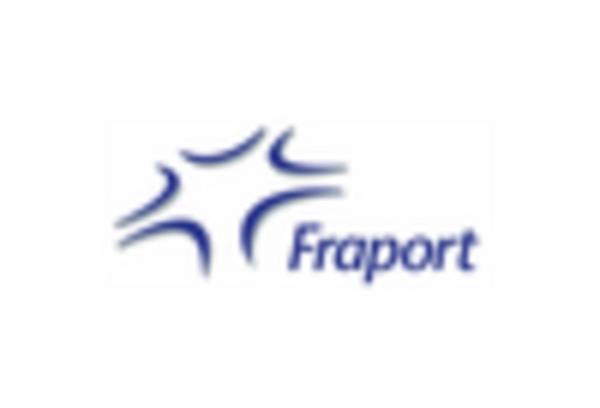Market Growth Projections
The Global Aviation Infrastructure Market Industry is poised for substantial growth, with projections indicating a market value of 541.32 USD Billion by 2035. This growth trajectory reflects a compound annual growth rate of 7.84% from 2025 to 2035, driven by various factors including increased air traffic, technological advancements, and government investments. The anticipated expansion of airport facilities and air traffic management systems is crucial to meet the demands of a growing global population. As the aviation sector continues to evolve, stakeholders are likely to focus on strategic investments that align with these growth projections, ensuring that infrastructure can adequately support future needs.
Growing Air Traffic Demand
The Global Aviation Infrastructure Market Industry is experiencing a surge in air traffic demand, driven by increasing globalization and economic growth. In 2024, the market is valued at approximately 235.94 USD Billion, reflecting the need for expanded airport facilities and enhanced air traffic management systems. As more individuals and businesses engage in international travel, the pressure on existing infrastructure intensifies. This trend is expected to continue, with projections indicating that by 2035, the market could reach 541.32 USD Billion. The anticipated compound annual growth rate of 7.84% from 2025 to 2035 underscores the urgency for investment in aviation infrastructure to accommodate this rising demand.
Sustainability Initiatives
Sustainability is becoming a pivotal focus within the Global Aviation Infrastructure Market Industry, as stakeholders seek to minimize environmental impacts. Airports and airlines are increasingly adopting green technologies and practices, such as renewable energy sources and sustainable building materials. This shift is driven by regulatory pressures and a growing public demand for environmentally responsible operations. For instance, several airports are investing in solar energy installations and electric ground support equipment. These initiatives not only contribute to reducing carbon footprints but also enhance the overall efficiency of aviation operations. As sustainability becomes a core component of infrastructure planning, it is likely to influence future investments and developments in the sector.
Technological Advancements
Technological innovations are reshaping the Global Aviation Infrastructure Market Industry, enhancing operational efficiency and safety. The integration of advanced technologies such as artificial intelligence, big data analytics, and the Internet of Things is becoming increasingly prevalent. These technologies facilitate smarter air traffic management, predictive maintenance, and improved passenger experiences. For instance, airports are adopting biometric screening and automated baggage handling systems, which streamline processes and reduce wait times. As these advancements continue to evolve, they are likely to drive further investment in infrastructure, ensuring that facilities can support the sophisticated demands of modern aviation.
Government Investments and Policies
Government initiatives play a crucial role in shaping the Global Aviation Infrastructure Market Industry. Many countries are recognizing the strategic importance of aviation infrastructure and are committing substantial investments to enhance their facilities. For example, various national governments are implementing policies that promote public-private partnerships to fund airport expansions and upgrades. These investments are not only aimed at improving passenger experience but also at boosting economic growth through job creation and increased tourism. As governments prioritize aviation infrastructure, the market is likely to witness accelerated growth, aligning with the projected increase in market value from 235.94 USD Billion in 2024 to 541.32 USD Billion by 2035.
Emerging Markets and Regional Development
Emerging markets are significantly influencing the Global Aviation Infrastructure Market Industry, as countries in Asia, Africa, and Latin America invest heavily in aviation infrastructure to support economic growth. These regions are witnessing rapid urbanization and increasing middle-class populations, which drive demand for air travel. Governments are prioritizing the development of new airports and the expansion of existing ones to accommodate this growth. For instance, countries like India and Brazil are undertaking massive airport modernization projects to enhance connectivity and stimulate tourism. This trend is expected to contribute to the overall market growth, aligning with the projected increase in market value from 235.94 USD Billion in 2024 to 541.32 USD Billion by 2035.

















